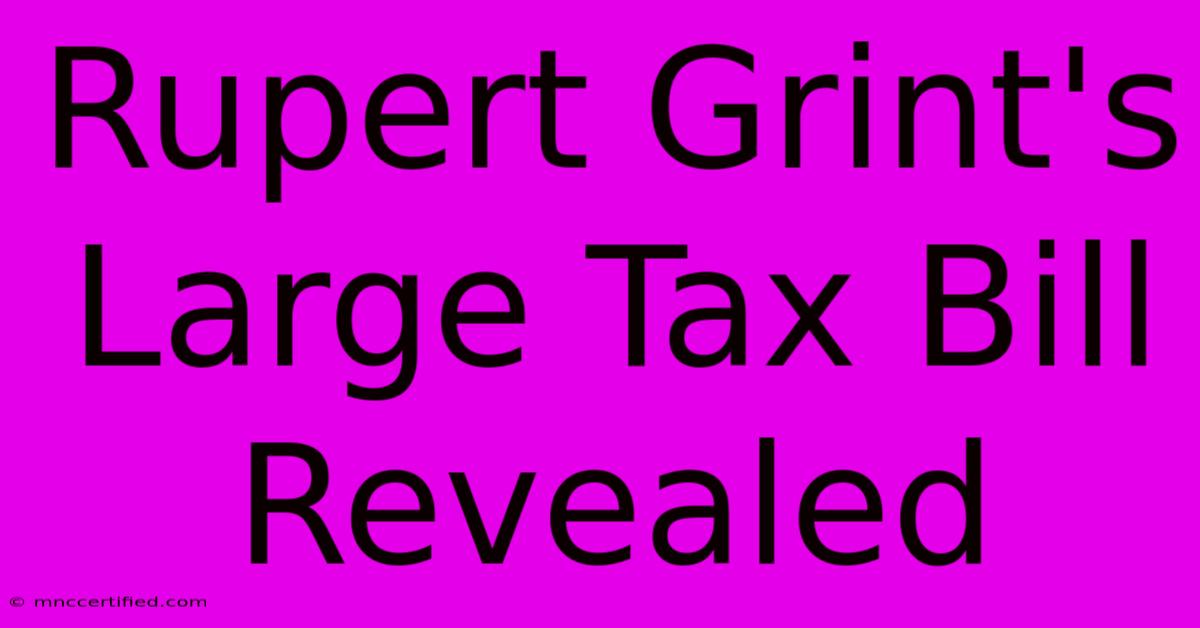Rupert Grint's Large Tax Bill Revealed

Table of Contents
Rupert Grint's Large Tax Bill Revealed: A Look at the Harry Potter Star's Finances
Rupert Grint, the beloved Ron Weasley from the Harry Potter film franchise, recently found himself in the headlines not for a magical escapade, but for a substantial tax bill. While the exact amount remains undisclosed, the news sparked considerable interest, prompting questions about the financial lives of celebrities and the complexities of high-net-worth individual taxation. This article delves into the situation, examining potential reasons behind the large bill and exploring broader implications for actors and high-earning individuals.
The Mystery Surrounding Grint's Tax Bill
The details surrounding Grint's tax liability are scarce, leaving much to speculation. Reputable news sources reported the substantial bill, but specifics regarding the period covered, the types of taxes involved (income tax, capital gains tax, national insurance contributions, etc.), and any potential penalties remain confidential. This secrecy is understandable, given the privacy concerns of high-profile individuals. However, the very fact of a large, undisclosed tax bill highlights the challenges of managing complex finances, particularly for those with significant income streams from various sources.
Potential Contributing Factors
Several factors could contribute to a large tax bill for someone in Grint's position. These include:
-
High Income: Grint's substantial earnings from the Harry Potter films, subsequent acting roles, and other business ventures contribute significantly to his taxable income. His income likely spans multiple tax years, further compounding the overall tax liability.
-
Investment Income: Beyond acting, actors often diversify their portfolios through investments. Capital gains from these investments, if significant, are taxed separately and can substantially increase overall tax liabilities.
-
Complex Tax Structures: Managing global income and assets necessitates navigating international tax laws, which can be incredibly complex. Any miscalculations or inefficiencies in tax planning can lead to significant penalties and back taxes.
-
Tax Audits: The possibility of a tax audit can't be ignored. These audits, while common, can uncover inconsistencies or errors leading to additional tax owed.
Navigating the Complexities of High-Net-Worth Taxation
The case of Rupert Grint’s tax bill underscores the complexities of managing finances for high-net-worth individuals. Professional financial advice is crucial for navigating the intricacies of tax laws, investment strategies, and estate planning. Seeking expert guidance from tax advisors and financial planners is essential for minimizing tax liabilities and ensuring compliance.
Lessons Learned for High Earners
Grint's situation serves as a reminder for anyone with significant income to:
-
Maintain meticulous financial records: Accurate record-keeping is paramount for ensuring tax compliance and avoiding potential disputes.
-
Seek professional tax advice: Engaging qualified tax professionals can significantly reduce the risk of errors and penalties.
-
Proactive tax planning: Developing a comprehensive tax strategy early on can help minimize tax burdens in the long run.
-
Diversify income streams: While not directly related to tax liability, diversifying income protects against unexpected financial downturns and reduces reliance on a single income source.
Conclusion: Beyond the Headlines
While the specifics of Rupert Grint's tax bill remain undisclosed, the story highlights the inherent complexities of wealth management and taxation for high-earning individuals. The case underscores the vital importance of meticulous financial planning, professional advice, and proactive tax strategies. It serves as a cautionary tale and a reminder that even those who have achieved incredible success require expert guidance to navigate the intricate world of high-net-worth taxation. The focus should move beyond the sensationalism of a "large tax bill" to a more constructive conversation about financial literacy and responsible wealth management.

Thank you for visiting our website wich cover about Rupert Grint's Large Tax Bill Revealed. We hope the information provided has been useful to you. Feel free to contact us if you have any questions or need further assistance. See you next time and dont miss to bookmark.
Featured Posts
-
Watch Nebraska Vs Iowa Football Free
Nov 30, 2024
-
Cypress Texas Home Insurance
Nov 30, 2024
-
Wealdstone V Wycombe Fa Cup Tv Coverage And Kick Off
Nov 30, 2024
-
Black Friday Conservative Sales
Nov 30, 2024
-
Mobile Home Insurance Tucson
Nov 30, 2024